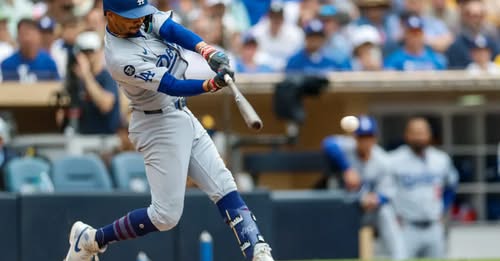Mookie Betts, one of Major League Baseball’s most dynamic and impactful players, has been a key figure for the Los Angeles Dodgers since joining the team. Known for his exceptional athleticism, clutch hitting, and leadership qualities, Betts is not only a cornerstone of the Dodgers’ lineup but also a respected voice in the clubhouse. Recently, news surfaced that Betts was away from the team for a period of time due to the death of a family member, a revelation confirmed by Dodgers’ manager Dave Roberts. This personal loss understandably required Betts to step away from the game temporarily, highlighting the human side of professional athletes who often have to balance the demands of their careers with the unpredictability and challenges of personal life.
Dave Roberts, speaking on behalf of the team, acknowledged the situation with sensitivity and respect. He made it clear that the Dodgers fully supported Betts during this difficult time and recognized the importance of family above all else. Roberts’ comments reflect a broader culture within professional sports that increasingly values the well-being of athletes beyond their performance on the field. The announcement was a reminder that behind the glamor and the intense spotlight, players like Betts are people first—individuals with families, relationships, and emotions.
The timing of Betts’ absence was a matter of concern for Dodgers fans and the broader baseball community, as he is often pivotal in high-pressure situations. His ability to impact games with both his bat and glove makes his presence crucial during the grueling MLB season. Yet, when personal tragedy strikes, even the most dedicated and focused athletes need to step back. It is a testament to Betts’ character and professionalism that he handled the situation with the necessary discretion, allowing himself the time and space to grieve while remaining connected to his teammates.
Betts’ journey to becoming a star player with the Dodgers has been remarkable. Since his trade from the Boston Red Sox to Los Angeles, Betts has continually proven to be one of the most valuable players in the league. His blend of speed, power, and defensive prowess has contributed to the Dodgers’ sustained competitiveness. His leadership extends beyond the diamond, where younger players look up to him for guidance both on and off the field. The respect he commands is not just for his athletic talent but also for his integrity and commitment.
The Dodgers, as an organization, have always emphasized a family-oriented culture. The way they handled Betts’ situation reflects that ethos. By publicly acknowledging his absence was due to a family bereavement, the team not only supported their player but also sent a message to others in professional sports about the importance of compassion and understanding in the face of personal loss. This approach fosters an environment where players feel secure enough to prioritize their mental and emotional health without fear of judgment or repercussion.
The impact of losing a family member is profound and can affect individuals in many ways, including their emotional stability, focus, and overall mental health. For athletes like Betts, who perform at the highest level under constant scrutiny, the pressure can be overwhelming. Taking time away to process grief is a vital part of healing and can ultimately help a player return stronger and more balanced. Mental health in sports has become a more openly discussed topic in recent years, with many leagues and teams implementing resources to assist players facing such challenges.
Betts’ temporary absence sparked conversations among fans and analysts about the human element in sports, reminding everyone that players are more than just their statistics and highlights. It also brought attention to the support systems within teams—coaches, teammates, and staff—who help players navigate difficult times. Dave Roberts, as a manager known for his calm demeanor and empathetic leadership, exemplifies how a coach’s role extends beyond strategy and into mentorship and care.
During Betts’ time away, the Dodgers had to adjust their lineup and rotations, which is a challenge for any team mid-season. But the way the team rallied in his absence showed their resilience and depth. Players stepped up to fill the void, and the collective effort underscored the team’s commitment to one another. It also highlighted how Betts’ presence is a catalyst for the team’s performance, not just because of his skills but due to the intangible qualities he brings—energy, confidence, and a winning mindset.
The situation also highlighted the role of communication in professional sports. The Dodgers’ decision to share the reason for Betts’ absence was handled with care, balancing transparency with respect for privacy. This openness helps build trust between players, the organization, and fans, fostering a more connected and supportive community. It reminds fans that while they celebrate the triumphs of their favorite players, they must also recognize their humanity and the challenges they face off the field.
Betts is known not only for his on-field achievements but also for his off-field contributions. He is active in community work and often uses his platform to advocate for social issues and support charitable causes. This involvement reflects his broader commitment to making a positive impact beyond baseball. The news of his family loss and the team’s response further humanizes him, showing that even those who seem larger-than-life deal with everyday struggles and the profound experiences that shape all of us.
As Betts returns to the Dodgers, the team and fans alike will undoubtedly rally around him. The support he receives during this period will be crucial to his recovery and his ability to perform at his best. His resilience and professionalism have been evident throughout his career, and this period of personal hardship will likely deepen his perspective and perhaps even enhance his role as a leader within the clubhouse.
The Dodgers organization, led by Dave Roberts, continues to prioritize a culture of empathy and strength. They understand that the well-being of their players is integral to the team’s success. Betts’ situation is a clear example of how professional sports can evolve to better support the holistic needs of athletes. By acknowledging and respecting the personal lives of players, teams create an environment where players feel valued not just as athletes but as whole people.
In the grand scope of a baseball season, moments like these put everything into perspective. Wins and losses, statistics and records, all momentarily take a back seat to the human experience. The Dodgers, by standing firmly behind Betts, demonstrate that while the game is important, the people who play it matter even more.
Looking ahead, Betts’ return will be welcomed with open arms. His talent on the field is undeniable, and his leadership is invaluable. But beyond that, his journey through this difficult time is a reminder of the strength and vulnerability that define us all. It serves as a poignant chapter in the ongoing story of a player who continues to inspire both on and off the field.
Ultimately, the news of Mookie Betts’ absence due to a family death, as disclosed by Dave Roberts, is more than a brief headline—it’s a reminder of the shared humanity between athletes and fans. It calls on all of us to approach sports with empathy and understanding, appreciating the person behind the player. In doing so, we not only honor Mookie Betts during this challenging time but also enrich our connection to the game and those who play it.



